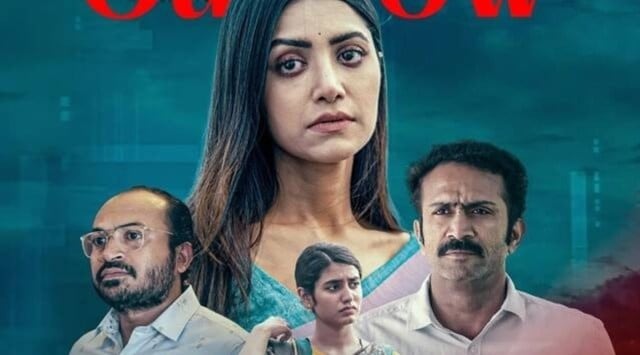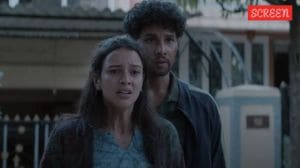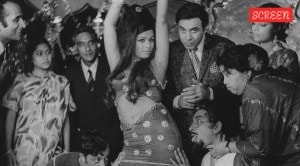Click here to follow Screen Digital on YouTube and stay updated with the latest from the world of cinema.
Live movie review: A Malayalam film on sensationalism and media trial that fails to strike the right chord
Despite its potential with a plot that remains relevant, Malayalam film Live fails to deliver a compelling movie experience due to its weak screenplay.
 Helmed by National Award-winning director VK Prakash, Live stars Mamta Mohandas, Soubin Shahir, Shine Tom Chacko, and Priya Prakash Varrier. (Image: Live Movie/Instagram)
Helmed by National Award-winning director VK Prakash, Live stars Mamta Mohandas, Soubin Shahir, Shine Tom Chacko, and Priya Prakash Varrier. (Image: Live Movie/Instagram) On August 30, 2007, Live India, a television news channel, aired a “sting operation” projecting a Delhi government schoolteacher running a prostitution racket. The broadcast triggered a disturbing chain of events, as a mob subjected the teacher to severe abuse, assault, and public humiliation. Swiftly arrested and subsequently terminated from her job by the Delhi government, she faced an uphill battle. However, a subsequent police investigation uncovered the operation’s fabrication, leading a Delhi court to absolve her. Seeking justice, she proceeded to file a defamation lawsuit against the channel and its then CEO and editor, Sudhir Chaudhary. As a consequence, the Ministry of Information and Broadcasting (I&B) imposed a one-month ban on the channel in September of the same year.
In May 2008, a Delhi city court granted Chaudhary bail after he furnished a surety and a personal bond, News18 reported. Later that year, as per a report by TOI, the teacher withdrew her defamation complaint against the news channel and its CEO after reaching a settlement. Chaudhary subsequently expressed his view that the reporter responsible for the investigation was untrustworthy and characterised the person as a “criminal” who had breached his trust. A report by DNA from 2013 quoted Chaudhary as telling IANS, “The reporter kept me in the dark and breached the trust. He is a criminal and a hazard for journalism.” However, this situation raised two important questions: whether the media can still be trusted, and if individual reporters are solely to blame, why do news organisations employ highly paid top editors?
Despite the incident being 15 years in the past, media outlets still face ongoing scrutiny for their alleged propagation of falsehoods and cosying up to those in power. In the midst of this environment, a new Malayalam film titled Live has emerged, seeking to address pressing themes such as sensationalism, the phenomenon of media trial, and society’s inclination to blindly accept anything it encounters online, often leading to hasty judgements and initiating witch hunts against the presumed “guilty”.
Helmed by National Award-winning director VK Prakash and produced by Darrpan Bangejaa and Nitin Kumar, Live features an ensemble cast comprising Mamta Mohandas, Soubin Shahir, Shine Tom Chacko, and Priya Prakash Varrier among others.
Set in Kochi in 2018, the movie opens with Sriram (Soubin Shahir) standing on the terrace of his apartment complex, burning some items. We are then introduced to his wife, Amala Sriram (Mamta Mohandas), a respected pediatric surgeon at a government hospital. Amala is known for her selfless acts, particularly during the devastating Kerala floods. However, she is currently being cyberstalked by an unknown person. Despite Amala’s attempts to seek help from her husband, it becomes evident that he doesn’t care about her predicament. Fortunately, Amala has supportive female friends who stand by her side unconditionally. Unfortunately, none of them can take action as the police and even Amala herself fail to identify the harasser.
Meanwhile, Amala’s dear friend Anna (Priya Prakash Varrier), a student preparing for medical entrance exams, becomes falsely accused of involvement in a sex racket. Although the police clear Anna of any wrongdoing, a TV news channel called Mandaram, owned by Sam John Vakathanam (Shine Tom Chacko), begins running stories targeting Anna in order to boost their viewership ratings. As Mandaram spreads the story, other news outlets and YouTube channels follow suit, making it nearly impossible for Anna to leave her house. Despite Amala and her friends’ efforts to assist Anna and her grandfather Kuruvachan (Jayraj Kozhikode), the news organisations refuse to back down.
The remainder of the film focuses on their attempts to prove Anna’s innocence amidst the destructive forces of sensationalism and media trials that threaten to ruin her life.
Despite its potential with a plot that remains relevant, Live fails to deliver a compelling movie experience due to its weak screenplay. The script, written by S Suresh Babu, known for his work on films such as Dada Sahib (2000), Shikkar (2010), and Kanal (2015), lacks the ability to create impactful moments. The film misses opportunities to evoke strong emotions in viewers, leaving them disconnected. Additionally, the portrayal of certain characters making light references to the names of individuals who have suffered due to casteism, such as Madhu, is highly problematic and unforgivable. Writers who are unable to handle such sensitive issues with justice should refrain from addressing them, as failing to do so may perpetuate casteist sentiments and provoke rightful criticism.
While VK Prakash has garnered acclaim for his impressive and meticulously crafted films like Nirnayakam (2015), Punaradhivasam (2000), Natholi Oru Cheriya Meenalla (2013), and Moonnamathoral (2006), it is important to acknowledge his tendency to produce highly disappointing movies such as Silence (2013), Poppins (2012), Three Kings (2011), and Gulumaal: The Escape (2009). Live, on the other hand, falls somewhere in between these two categories, leaning slightly towards the side of his subpar works. The film, in a sense, reflects Prakash’s evident lack of effort as a director.
Meanwhile, the performances by Mamta Mohandas and Soubin Shahir in the film are inadequate and fail to make an impact. Mamta, despite making occasional attempts to portray Amala convincingly, falls short due to poorly delivered dialogue and a seeming lack of trust or understanding of the character. While Soubin’s performance in Live is an improvement compared to his extremely disappointing portrayals in films like CBI 5: The Brain (2022) and Jack N’ Jill (2022), his acting remains below average, considering his talent as an actor.
In contrast, Shine Tom Chacko appears to be trapped in a peculiar cycle of self-imitation. The same irritating persona that is evident in his real-life interviews and has been previously seen in films like Christopher (2023) is replicated here as well. It’s important for him to realise that not all characters need to be excessively exaggerated to be annoying. He could take a cue from Thilakan’s portrayal of the antagonist in the 1986 film Namukku Parkkan Munthirithoppukal to understand this. If VK Prakash’s intention in casting Shine Tom was to ensure that viewers feel repulsed by the character Sam John, then the director has indeed succeeded. However, Shine should make an effort to approach each character differently and deliver a performance that aligns with their nature, rather than forcefully imposing his quirks and traits onto them.
On the other hand, Jayraj Kozhikode and, surprisingly, Priya Prakash Varrier deliver commendable performances as the distressed Kuruvachan and the shattered Anna, respectively.
It is deeply disappointing to see the wasted potential of a talented cinematographer like Nikhil S Praveen in this film, as it fails to offer anything beyond what is already written in the script. The only aspects deserving of commendation in this movie are the costumes by Adithya Nanu and the makeup by Rajesh Nenmara.
In short, Live joins the ranks of other Malayalam films that, despite attempting to tackle a socially relevant subject, fail to grasp its true purpose.
Live movie cast: Mamta Mohandas, Soubin Shahir, Shine Tom Chacko, Priya Prakash Varrier
Live movie director: VK Prakash
Live movie rating: 2 stars
Photos


- 01
- 02
- 03
- 04
- 05
































